A lot of times, the sibling relationship between a ‘typical’ and a ‘child with special needs’ is perceived and presumed to be all hunky-dory. Just like how we love to talk about the ‘unconditional love of parents and conveniently overlook the hidden nuances of what a spectrum it is,’ a sibling too is often made to feel guilty if he feels anything but love for his/her brother or sister with additional needs. The relationship between the two is almost always presented with overflowing love and affection, something that we often read about on well-written parents’ blogs – sensitive, respectful, uncomplicated, and full of love. However, the truth is that even if it seems all ‘sugary with love’, it cannot remain consistent throughout their growing up years. Those who think otherwise may be reading too much fiction and need a reality check!
Think about it, can any relationship be all about one emotion? Do we really look close enough or scratch the surface a little and have an open heart to heart talks with our ‘typical’ children? Do we not assume that they are young and do not go through the similar roller coaster ride of emotions that we as parents experience? Do we make them feel guilty for feeling embarrassed for their little sister or brother?
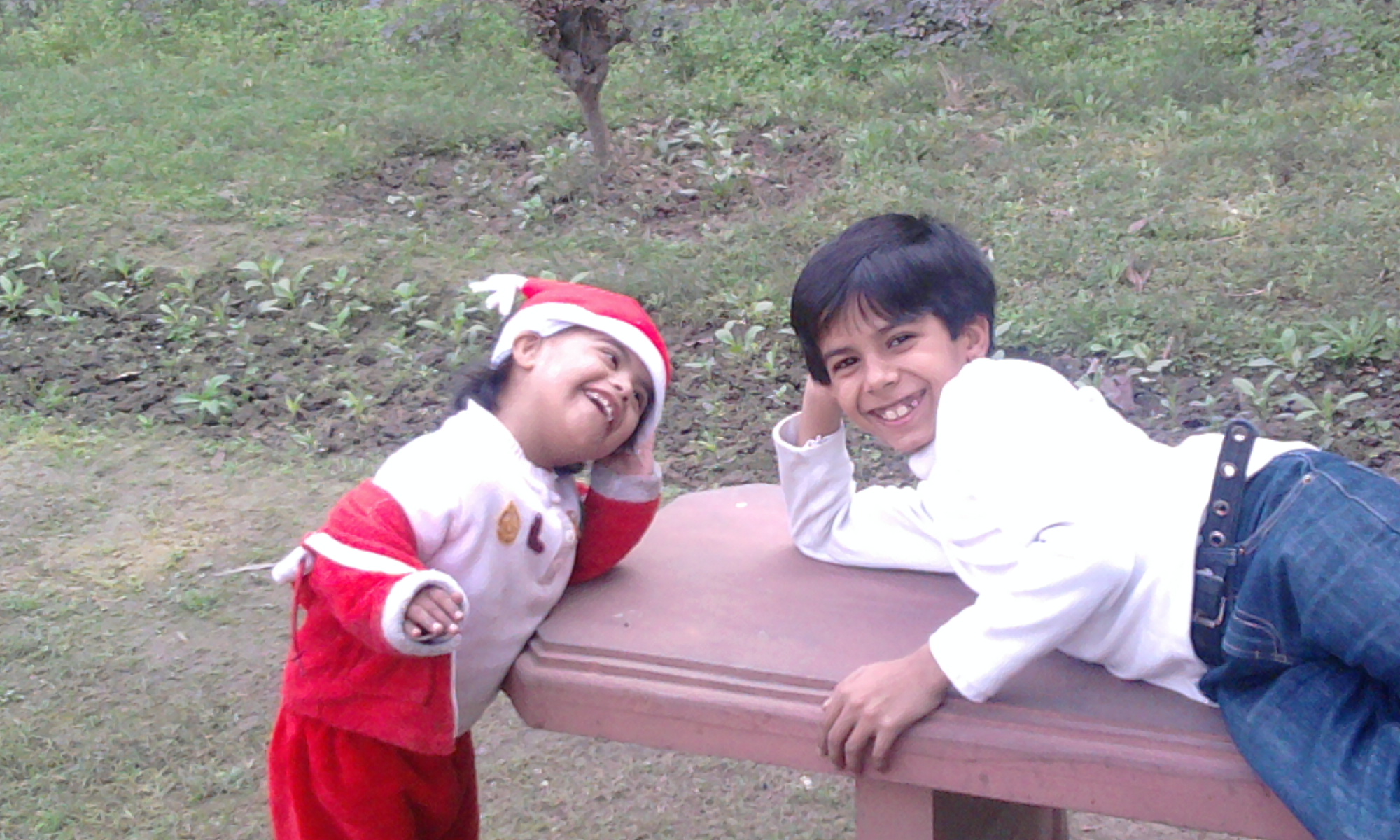
The Truth?
The truth is that a sibling’s role is still the least talked about. Even though, they remain that one person who is going to share the longest lasting relationship with our child of special needs, more than the parents! We like to believe that as parents we have it hardest, but pay a little attention and you will be surprised to find out that it’s not always compassion, sympathy or love that our ‘neuro-typical’ child is experiencing. They too have concerns which are in some ways identical to what we as parents go through like a need for information, guilt, blaming themselves, loneliness, future concerns and in some ways quite different emotions like peer issues, resentment, sibling rivalry, lack of attention from paretns in their formative years and a pressure to perform.
It also makes a great difference if the sibling is elder or younger to the child with disability. It is because the younger siblings don’t know any other way of life; they are born into that situation. But in case of older siblings and especially if there is a large age gap, they remember the attention and the time they solely shared with the parents.
From the Horse’s Mouth
While reading and researching about this issue, I came across a radio show excerpts on ‘Siblings with special needs change childhood’. The show was asking people to share their ‘experiences of having a brother or a sister with special needs’. I was all ready to hear some nice emotional sentiments and touching stories of how that experience changed the lives of these callers and how they were eternally thankful for having the brothers or sisters they had, but I had the reality biting me in few seconds when I heard the reactions of a Girl with a special needs brother.
In her own words, ‘you know, as we grew up, I can relate to being kind of ashamed of my brother but also kind of missing out on a brother-sister relationship like my friends had. And that was difficult too. You know, and a lot of attention does go to the child. I can remember coming home from school a lot of times, and my Mom, you know, was somewhere with my brother for some sort of an appointment, and this went on and on for like a couple of school years this way”
I almost felt wet in my eyes. Was it my story? Was I giving too much attention to my daughter with Down syndrome? I started listening again to be sure if that call was just an exception, but there were more calls to follow.
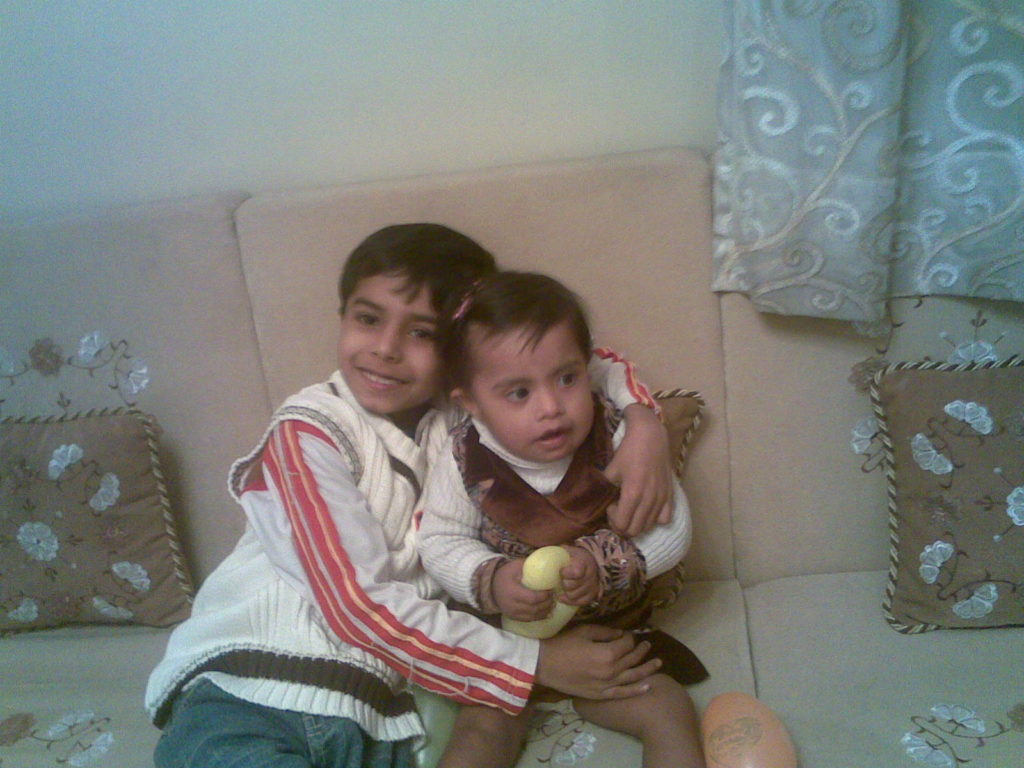
The co-host who was a physician and an author, shared her own experience saying,’ I was a teenager. I was probably about 16 or 17. And I was going on a date with a guy I really liked. And he was picking me up from home. And I did not want him to see my brother, I have a younger brother with autism, and I locked up – I locked my brother up in a room so nobody could see him.
This hit me and hit me pretty hard! While we all look forward to the auto default responses like ‘the birth of my brother/sister really changed my life and made me a better person’ but sometimes these are not the only emotions they have.
Though we all know that resentment or negative feelings are not the only thing our little ones experience. They do learn to accept, have patience and form true bond with their ‘special’ little brother or sister in the process of growing up. They grow up to be some most compassionate people in this World and that is the reason, it becomes our responsibility to make this transition smooth and this journey memorable for them.
According to a research, Skotko and Levine (2006) who had combined 33 years of experience of conducting workshops for more than 3,380 brothers and sisters of children with Down syndrome believe that, though siblings have both positive and negative feelings, they generally have more positive experiences. However, siblings highlighted that the responsibility should be limited.
We all have read multiple lists, pointers and things to ‘do’ or ‘not to do’ to have a healthy sibling relationship in the house and the following points may just be an extension of what you already know but it is always good to reinforce, read and figure out if you are really doing what you should be doing…
1.They are typical, let them be
Its easier said than done and we all are guilty of telling our typical kids to behave, not run after or bully the ‘special’ one. The truth is that a child with special needs who grows up with siblings, with whom he sometimes fights will likely be better prepared to face life in the community as an adult than a child, who grows up as an only child. Similarly we need to think twice before making statements like, don’t push, no name calling, why are you embarrassed, you should understand. He can’t, etc. Let them misbehave, fight, get jealous and be angry. These all emotions are needed for a sound social development.
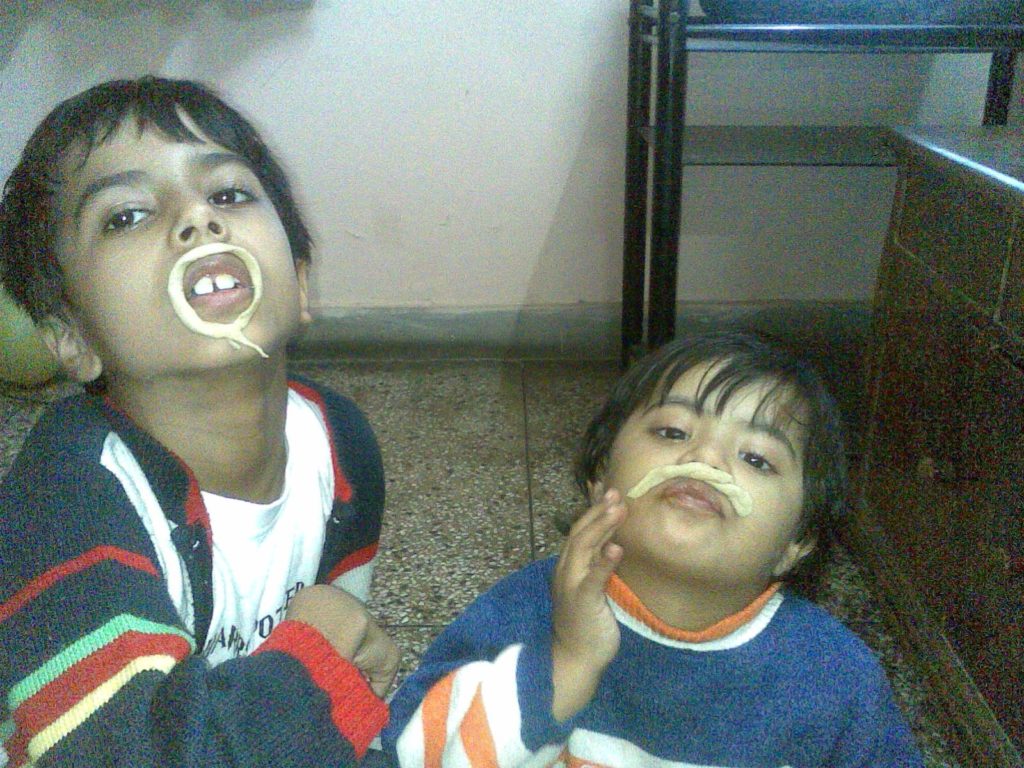
2.Teach them humour
We can’t always choose what we look at, but we can surely choose how we look at it. Having a child or sibling with disability is a not always a situation people dream about, but it is also not something that is beyond Tragic. Teach them about the importance of humour in life. You are his/ her greatest Role Model. If you complain about the difficulties, problems, challenges and how unfortunate your situation is, then it is more than likely that your child will experience all or more of that. However, if you treat the difficulties as a challenge and your house has more laughter and humour than tears or whining, than you sure are giving your child one of the greatest gifts of his life. Share funny tales about your childhood; keep funny names of family members or routine actions. My Son laughs about how her down syndrome is infecting all of us and we are all slowly getting a little slow! He calls her “Food Bomb” and jokes how she is the most dangerous weapon of all who one day is going to finish all food from this earth! So laugh it out and keep it funny because ‘Behaviour is not taught, its Caught’!
3. Educate
The common misconception of thinking that our kids are too young to understand ‘the disability’ have no basis and allowing the diagnosis to be a secret can prove to be disastrous, because your ‘neuro-typical’ child would not be able to understand why his parents are paying all the attention to his brother/ sister. He/she would surely know something is different and will keep on wondering unless you as parents educate him, try acknowledging his concerns and tell him in the most simple and scientific way. Trust that our kids are smarter than we think and you’ll be proven right.
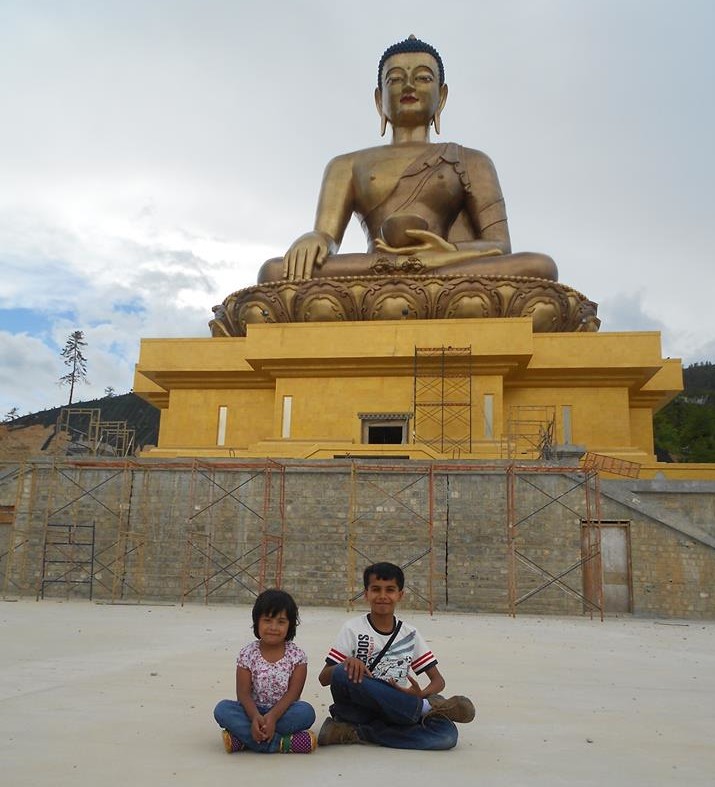
4. Individual attention
5. Introduce them to other siblings
For all of us reading, we understand the solace found in connecting with another parent facing similar challenges. It’s a source of support, learning, and sometimes just a space to vent or compare experiences. However, our children often lack this outlet to share their innermost fears or concerns about their special needs sibling. We know the significance of peer groups in a child’s life, particularly when a few peers share similar situations. This shared understanding can ease the burden of expressing emotions, allowing our children to feel understood and accepted with their ‘feelings’. As parents, it’s our duty to facilitate these connections by meeting other parents with typically developing children of similar ages.
Here is a video from Arc3 siblings which I found extremely informative and insightful from siblings of different ages and different cultural backgrounds. Its almost 14 minutes long but a must watch for all the parents.
Source Credit:
http://wmra.org/post/siblings-special-needs-change-childhood


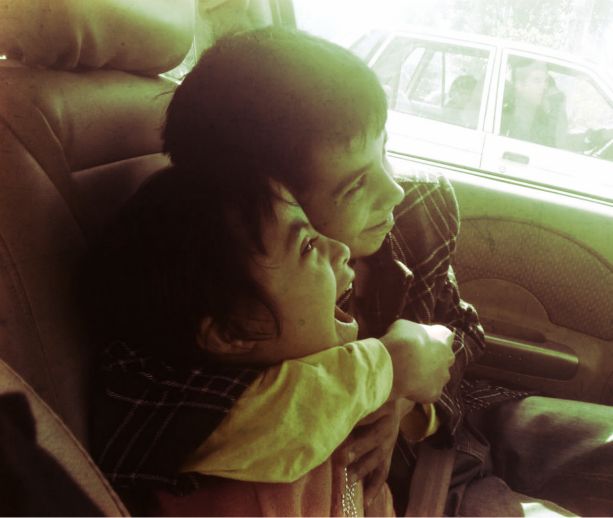




Hi deepa – its an excellent read and this is much required reality check also for us as parents. Thanks for the post it helps in putting things in right perspective, esp. In context of my typical elder son.
Continue the great work, you truly are an evolved parent.
Regd
Punit
Thanks Punit sir for these encouraging words. God bless
Deepa you have put it so very nicely ..I have a autistic son n I feel though my daughter very caring n cocerned for him do gets irritated at times which comes across as a very natural behaviour amongst siblings but takes a different turn in such cases.n we as parents see it in a different light n become too judgmental ignoring her feelings at times..I can truly relate to this
You are right Meenakshi, we as parents can sometimes trust our instincts too much and think we know all whereas a few situations especially like this which we have not dealt with anytime in the past can be extremely tricky to handle. I am glad you stopped by to read. Thanks 🙂
Hi Deepa, three years back I might have just skipped reading this piece, but today when my son is 3 years old and knows decisively that his 10 year old sister with DS is different from the other kids, i have paid very close attention to each and every word you have written and it has given me a whole different perspective….Thanks for writing this
Thanks Sonali for writing these precious words. When I wrote this, I too was on a similar journey where I was wondering, weighing, contemplating and observing everything about sibling relationships and how we don’t give it as much importance. Thanks for liking and visiting the blog 🙂
Thanks for addressing the crucial but often overlooked topic of siblings of children with special needs. Many of the same concerns apply to families of young children where one parent has special needs or a disability. Children in caregiving families need extra support and opportunities to shed the caregiving role now and then.
Thanks, too, for adding this post to the DifferentDream.com link share.
Thanks Jolene for stopping by. Yes, you are right. Children in caregiving families do need respite every now and then and it is important for parents to make sure that children get such opportunities often.
Deepa,
It seems there is such a balance to strike between siblings. One of our local support groups started offering Sibshops this spring. As soon as our youngest is old enough we will make sure she is sharing and working through these feelings with her peers. I think it is so important for siblings to have others who can relate to what they are experiencing.
You are right Sabrina! It is immensely important for parents to not neglect the ‘typical’ child and also to give him platform for venting out his/her feelings. such support groups are a great idea. Thanks for writing.
Thank you for your post. I am a sibling of a special needs child. My sister was born in 1961, so things are very different now. There were no support groups or respite care available to help my mom. She had seven children, the youngest disabled. My mother did an amazing job in helping our special needs sister reach her full potential. However, without realizing it, she emotionally neglected her other children. She devoted herself to caring for our sister and the rest of us were kind of left on our own. Our dad was from the generation of men who believed their role was to be the provider, so he was uninvolved in the care or nurturing of the children. I am so glad that things have changed today. I dearly love my sister and all special needs children. I have the utmost respect for parents of special needs children. But, what you say is true. Somehow parents must find a way to have one on one time with their typical children. Thank you for your post.
Thanks Anita. When I started writing this post, I knew lot of people would not like this too much ‘on your face’ reality check and I am glad you could understand that just like every child and every sibling, every home is different and we cannot paint all siblings with the same ‘love only’paint brush. Knowing that your sister was born in 1961, I, so much respect your mother that she took care of her and dedicated herself to caring for her. While neglecting you all might have been an unintentional outcome of devoting all her time with your little sister but I am sure back then a lot of things were going against her. When we say that parents need one to one time with their typical children we should understand that today things are so different and the children are so much vulnerable from what it was back then.
Thanks a ton for dropping by. Keep visiting
Deepa